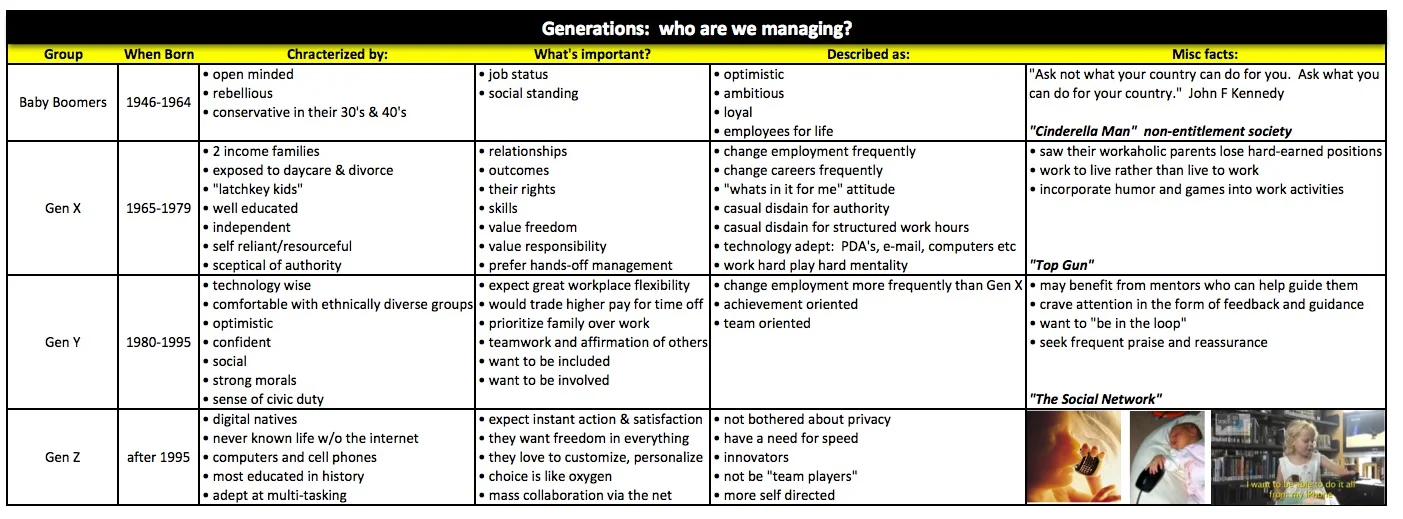Generations
Working age Americans fall into various generations: Baby Boomers, Gen X and Gen Y with Gen Z, the digital natives quickly coming upon us. Each generation has grown up with differing experiences that has shaped their view of life and work. The following summarizes each generation. Understanding the generational differences in the workplace can benefit the manager through understanding what’s important to each.
Baby Boomers
Most sources identify Baby Boomers as people born between 1946 and 1964. This generation is referred to the Baby Boom generation because 17,000,000 more people were born during this period compared to the previous period. This group has had the largest impact on American society due to its size of roughly 78 million people.
Boomers witnessed and took part in political and social turmoil. The Vietnam War, civil rights riots, Kennedy assassination, Martin Luther King assassination, Watergate and the sexual revolution shaped their views. Protesting against power characterized the formative years of many of these individuals now in leadership positions in numerous organizations.
Boomers were raised to respect authority figures but they learned not to trust “anyone over 30”. They grew up in an era of prosperity. The oldest boomers are 68 as of 2014, are financially secure and as a whole are thought of as the “turning silver into gold” generation where they are seeking a 2nd career as a means to enjoy their life.
Boomers are individuals who believe that hard work and sacrifice are the price to pay for success. They started the workaholic trend. They are confident task completers who may be insulted by constant feedback although they want their accomplishments to be recognized.
Boomers have also been characterized as having a sense of entitlement and as being good at relationships where they are reluctant to go against peers and the judgments of others who do not see things their way. They thrive on the possibility for change and are also described as the show me generation. They value the chain of command, may be technically challenged and respect authority.
Generation X
This segment is defined as born between 1965 and 1979. Members of Gen X are the children of older boomers, who grew up in a period of financial, family and societal insecurity. They witnessed their working parents get laid off after a lifetime of commitment to the company they worked for. They grew up during a time of a stagnant job market, corporate downsizing, limited wage mobility and are the first individuals predicted to earn less than their parents did. They have grown up in homes where both their parents worked, or in a single parent household because of high divorce rates, and as such, became latchkey kids forced to fend for themselves. They were influenced by MTV, AIDS and global competition and are accustomed to receiving instant feedback from playing video games.
Gen Xers are characterized as looking for balance between work and life. They are independent, autonomous and self-reliant compared to previous generations. They are not overly loyal to their employer. Remember, they saw their working parents lose their jobs after a lifetime of commitment to their employer. They value continuous learning and skill development. They have strong technical skills and are results focused and are ruled by a sense of accomplishment and not the clock. They naturally question authority figures and are not intimidated by them. Money does not necessarily motivate them but the absence of money may lead to less motivation. They like to receive feedback and desire a flexible working schedule. Work must be fun or they will not tolerate it. They are entrepreneurial, creative and although individualistic they like teamwork more so than boomers.
Gen Y
Born between 1980 and 1995 Gen Y have been labeled as the Millenials, Nexters, Generation www or the feel good generation. This generation has been shaped by technology so they have a unique comfort with technology. They value team-work, collective action, embrace diversity, are optimistic and adaptable to change. They seek flexibility, are independent and desire a more balanced life. Gen Y are highly educated and are good at multi-tasking. They are also characterized as demanding and the most confident generation.

